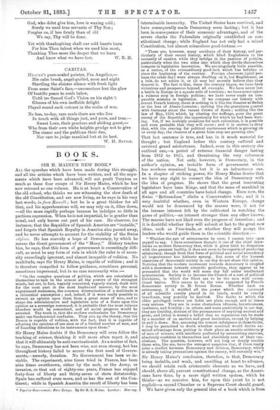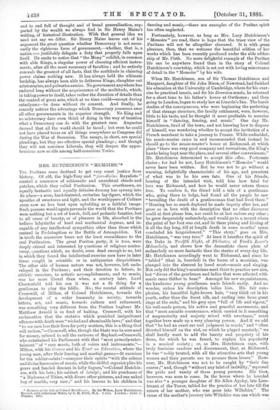BOOKS.
SIR H. MAINE'S NEW BOOK.* ALL the speeches which have been made during this struggle, and all the articles which have been written, and all the argu- ments which have been advanced, will not profit Toryism so much as these four essays of Sir Henry Maine, which he has now reissued as one volume. He is at heart a Conservative of
the old school, who thinks we are witnessing the slow death of the old Constitution, and are now living, as be says in his very last words, in fceas Romitli ; but he is a great thinker for all that, and his apprehensions will, we may rely on it, filter down, —all the more rapidly perhaps because he indulges so little in partisan expression. When he is not impartial, he is gentler than usual, and only leaves out part of his case. He observes, for instance, that the Republics of Spanish America are "instable," and forgets that Spanish Royalty in America also passed away, and he never attempts to account for the stability of the Swiss regime. He has scarcely a hope of Democracy, by which he means the direct government of the "Many." History teaches him, he says, that this form of government is exceedingly diffi- cult, as must be any form of rule in which the ruler is of neces-
sity exceedingly ignorant, and almost incapable of volition. No multitude, says Sir Henry Maine, is capable of volition ; and it
is therefore compelled to follow guidance, sometimes personal, sometimes impersonal, but in no case necessarily wise :— "On the complex questions of politics, which are calculated in themselves to task to the utmost all the powers of the strongest minds, but are, in fact, vaguely conceived, vaguely stated, dealt with for the most part in the most haphazard manner, by the most experienced statesmen, the common determination of a multitude is a chimerical assumption ; and, indeed, if it were really possible to extract an opinion upon them from a great mass of men, and to shape the administrative and legislative acts of a State upon this opinion as a sovereign command, it is probable that the most ruinous blunders would be committed, and all social progress would be arrested. The truth is, that the modern enthasiasts for Democracy make one fundamental confusion. They mix up the theory, that the Demos is capable of volition, with the fact, that it is capable of adopting the opinions of one man or of a limited number of men, and of founding directions to its instruments upon them."
Sir Henry Maine doubts if the Democracy will even follow the teaching of science, thinking it will more often reject it, and that it will ultimately be anti-vaccinationist. As a matter of fact, he says, Democracy has not been wise, nor even strong, but has throughout history failed to secure the first need of Govern- ments,—namely, duration. No Government has been so in- stable. The experiment, nine times tried in France, has been nine times overthrown, either by the mob, or the Army, or invasion, so that out of eighty-one years, France has enjoyed forty-four of liberty and thirty-seven of stern dictatorship. Spain has suffered even more, and so has the rest of the Con- tinent; while in Spanish America the result of liberty has been
• Popular Government : Four Essays. By Sir H. 8. Maine. London : Mar ray.
interminable insecurity. The "United States have survived, and have consequently made Democracy seem lasting ; but it has been in consequence of their economic advantages, and of the severe checks the Federalists originally established on con- stitutional change; while England has not only had a mixed Constitution, but almost miraculous good-fortune :—
" There are, however, many accidents of their history, and par- ticularly of their recent history, which blind Englishmen to the necessity of caution while they indulge in the pastime of politics, particularly when the two sides into which they divide themselves compete in legislative innovation. We are singularly little sensible, as a nation, of the extraordinary good-lack which has befallen us since the beginning of the century. Foreign observers (until per- haps the other day) were always dwelling on it, but Englishmen, as a rule, do not notice it, or (it may be) secretly believe that they deserve it. The fact is that, since the century began, we have been victorious and prosperous beyond all example. We have never lost a battle in Europe or a square mile of territory; we have never taken a ruinous step in foreign politics ; we have never made an irre- parable mistake in legislation. If we compare our history with recent French history, there is nothing in it like the disaster at Sedan or the loss of Alsace-Lorraine; nothing like the gratuitous quarrel with Germany about the vacant Crown of Spain ; nothing like the law of May, 1850, which, by altering the suffrage, gave the great enemy of the Republic the opportunity for which he had been wait- ing. Yet, if we multiply occasions for such calamities, it is possible and even probable that they will occur ; and it is useless to deny that, with the craving for political excitement which is growing on us every day, the chances of a great false step are growing also."
That last sentence is true, and has in it much material for thought ; but England before this century suffered and survived grand misfortunes. Indeed, even in this century she outlived one,—a period of extreme financial danger lasting from 1812 to 1825, and threatening the very coherence of the nation. Not only, however, is Democracy, in the author's opinion, an instable form of government which has nowhere remained long, but it is an infructuous one. In a chapter of striking power, Sir Henry Maine denies that we have any right to connect the idea of Democracy with the idea of progress. He shows that the great innovating legislators have been Kings, and that the mass of mankind in all ages and all countries have hated change. Even now, the Swiss "Referendum" elicits a Conservative vote ; and it is very doubtful whether, even in Western Europe, change would not be denounced by the masses were, it not for the intense interest felt by the cultivated in watching the game of politics,—an interest stronger than any other known. The masses have not liked even the progress of invention; and it is doubtful whether they will submit at last to the great new ideas, such as Free-trade, or whether they will accept the leaders who would guide them in the scientific direction :—
"Whether the age of aristocracies be over, I cannot take upon myself to say. I have sometimes thought it one of the chief draw- backs on modern Democracy that, while it gives birth to despotism with the greatest facility, it does not seem to he capable of producing aristocracy, though from that form of political and social ascendency all improvement has hitherto sprung. But some of the keenest observers of democratic society in our day do not share this opinion. Noticing that the modern movement towards democracy is coupled with a movement towards scientific perfection, they appear to be persuaded that the world will some day fall under intellectual aristocracies. Society is to become the Church of a sort of political Calvinism, in which the Elect are to be the men with excep- tional brains. This seems to be the view suggested by French democratic society to M. Ernest Renan. Whether such an aristocracy, if it wielded all the power which the command of all scientific results placed in its hands, would be exactly beneficent, may possibly be doubted. The faults to which the older privileged orders are liable are plain enough and at times very serious. They are in some characters idleness, luxuriousness, insolence, and frivolity ; in others, and more particularly in our day, they are timidity, distrust of the permanence of anything ancient and great, and (what is worse) a belief that no reputation can be made by a member of an ancient and great institution, except by helping to pull it down. Bat, assuming the utmost indulgence in these faults, I may be permitted to doubt whether mankind would derive un- mixed advantage from putting in their place an ascetic, aristocracy of men of science, with intellects perfected by unremitting exercise, absolutely confident in themselves and absolutely sure of their con- clusions. The question, however, will not long or deeply trouble those who, like me, have the strongest suspicion that, if there really arise a conflict between Democracy and Science, Democracy, which is already taking precautions against the enemy, will certainly win."
Sir Henry Maine's conclusion, therefore, is that, Democracy being instable, and weak, and unwilling at heart to advance, we should retain such aristocratic elements as we have, and should, above all, prevent constitutional change, as the Ameri- cans have done, by a more rigid written system, which he thinks—as we conceive him, for upon this point he is not explicit—a second Chamber or a Supreme Court should guard.
We have given only the general idea of a book which is from
end to end full of thought and of broad generalisation, sup- ported by the wealth we always find in Sir Henry Maine's writing, of historical illustration. With that general idea we need not say we differ. Sir Henry Maine leaves out of his argument the great question whether Democracy is not neces- sarily the righteous form of government,—whether, that is, a nation can justifiably delegate a duty that properly falls upon itself. He omits to notice that "the Many" exhibit, in common with able Kings, a singular power of choosing efficient instru- ments, after all the most necessary of faculties ; and he entirely conceals the greatest of all facts, that the multitude in claiming power claims nothing new. It has always held the ultimate lordship, has always been able to dethrone Kings, slaughter out aristocracies, and pulverise armies. No government anywhere has endured long without the acquiescence of the multitude, which, in taking power to itself, takes rather the direction of details than the control of great acts, which at no time could—except during cataclysms—be done without its consent. And finally, he scarcely notices the advantage which Democracy possesses over all other governments in its superior strength. No King and no aristocracy dare even think of doing in the way of taxation what a Democracy can do with the greatest ease. Augustus decreed that all the world should be taxed ; but even he could not have placed taxes on all things everywhere as Congress did during the War of Secession. The essays, in short, are special pleadings, but they are effective special pleadings ; and though they will not convince Liberals, they will deepen the appre- hensions now so rife among half-conscious Tories.







































 Previous page
Previous page